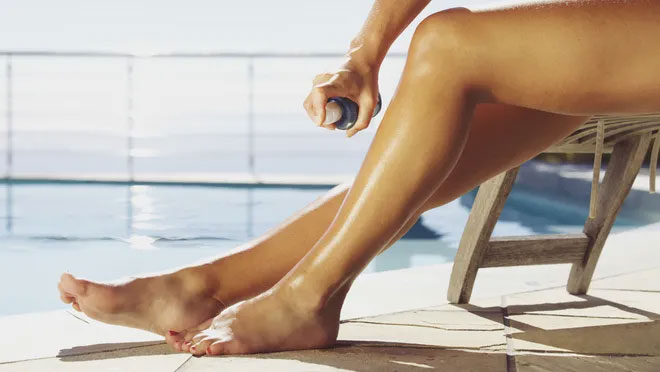.jpg)
13, Jul 2021
Most skin cancers are caused because of increased exposure to ultraviolet (UV) rays that mostly come from the sun, as well as indoor tanning beds and sun lamps.
People living in areas of bright sunlight year-round and people spending a lot of time outdoors without protective clothing and sunscreen have a higher risk of skin cancer as UV rays can penetrate and make cellular changes to the skin.
July is UV safety awareness month.
In the continental United States, between 10 a.m. and 4 p.m., daylight savings time is considered the most hazardous time for UV exposure. It is important to note that UV rays can get through to the ground, even on a cloudy day.
The main types of UV rays are UVA rays and UVB rays. UVB rays typically have more energy and are a more potent cause of at least some skin cancers, although UVA and UVB rays can cause skin damage and cancer.
The strength of the sun’s UV rays depends on several factors, such as the time of day, the season of the year, latitude, altitude, cloud cover, and reflection from surfaces.
Sun protection is crucial, not only for only a day spent at the beach or poolside, but every single time you are in the sun.
Simply staying under shade is one of the best ways to limit your UV exposure. If you do go out in the sun, remember to wear a shirt, apply sunscreen and wear a brimmed hat. Wear wrap on sunglasses to protect the eyes and skin around them.
Do not get tricked by cloudy days or being in the water or snow; UV rays reach the ground at variable strengths all year regardless. Snow, sand and water reflect sunlight, increasing the amount of UV radiation you may receive.
We must give a lot of emphasis to protecting our skin from UV rays, particularly during the summer months.
More: Mitra: Ways to help mitigate migraine headaches
More: Mitra: Do you suffer intestinal problems? You might have celiac disease
More: Mitra: April is the right time to learn about stress mitigation
Clothes provide different levels of UV protection.
Tightly woven dark-colored, long-sleeved shirts and pants, and dark colors in general, provide more protection.
The use of sunscreen helps, but some UV rays still get through.
Consider sunscreen as one part of your primary skin cancer protection plan, especially if a shade or protective clothing is not available.
Sunscreens come in many forms, such as lotions, creams, ointments, wipes, gels, sprays and even lip balms.
Some make-up and cosmetics, such as moisturizers, lipsticks and foundations are considered sunscreen products if they have sunscreen.
Be sure to apply the sunscreen generously and adequately, paying close attention to your face, arms, neck and any other areas not covered by clothing.
Please remember to read the label of sunscreens and look for broad-spectrum protection against UVA and UVB rays and products with sun protection factor (SPF) values of 30 or higher.

Sunscreen needs to be reapplied every two hours to maintain protection. Sunscreen will need to be reapplied as it may wash off from sweat or swimming.
Hats made of tightly-woven fabric are more protective. A shade cap or a brimmed hat with a 2- to 3-inch brim covering the ears, eyes, forehead, nose and scalp is excellent for sun protection.
We must not forget about protecting our eyes, as most exposure to bright sunlight increases the risk of developing cataracts, macular degeneration and even eye cancer. Wearing appropriate eye protection such as UV blocking oversized framed wrap-around sunglasses or proper tanning goggles helps.
Vitamin D has many health benefits, such as lowering the risk for some cancers.
Your skin makes vitamin D naturally in the presence of the sun. The vitamin D amount depends on your age, how dark your skin is and how intense the sun is.
It is always better to get vitamin D from diet or dietary supplements rather than sun exposure to avoid skin cancer risk.
Dr. Sue Mitra is accepting new patients and can be reached at 321-622-6222. Call now to discuss UV safety awareness and the best possible next steps to assess your risk of skin cancer.
Dr. Sue Mitra and her staff strive to offer their patients the best care, advice and services available in the medical field with the goal to keep patient healthy & happy.

Dr. Sue Mitra is board certified in international medicine. She is seen here with a Cologuard, which is a noninvasive colon cancer screening test. (Photo by: Tim Shortt/Florida Today)